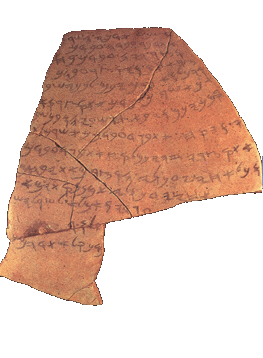Description: Written on the potsherd is a letter of protest which was written by a Jewish farmer to the governor of the region 2600 years ago. In this letter the farmer complains that his garment was taken from him unjustly, and he asks the governor to act on his behalf in order that his garment be returned to him. This fragment of pottery is now in the Israel Museum in Jerusalem.
Era: Middle Semitic Script
Image Credit: Unknown
Date of Inscription: 621 BCE
Location of Discovery: Palmachim Israel
Date of Discovery: 1960
Current Location: Israel Museum, Jerusalem Israel
Language: Hebrew
Writing Surface: Ostraca (pottery fragment)
Transliteration: TBD
Translation: TBD
Comments: Comments from Dror Porat, director of the museum
A letter of complaint from the fortress of hashabaiah: in the course of diggings under the auspices of the Division of Antiquities of the israeli Government in 1960, a member of kibbutz palmachim, Shmulik Lifshitz, discovered a pieace of ancient pottery on a small hill, about three kilometers south of palmachim. The piece of pottery was a very special archaeological find of its kind, because there is almost nothing similar to it in the country. Written on it was a letter of protest which was written by a Jewish farmer to the governor of the region 2600 years ago, about 621 B. C. in this letter the farmer complains that his garment was taken from him unjustly, and he asks the governor to act on his behalf in order that his garment be returned to him. This fragment of pottery is now in the Israel Museum in Jerusalem and in diggings which took place on the spot where the fragment was found, there was discovered an ancient Israeli fortress from the same period, which was called, "hashabaiah's Fortress", from the name of the man who took the garment of the farmer, and whose name appears in the letter. The farmer's complaint was based on the biblical rule found in EXODUS 22:26-27.



